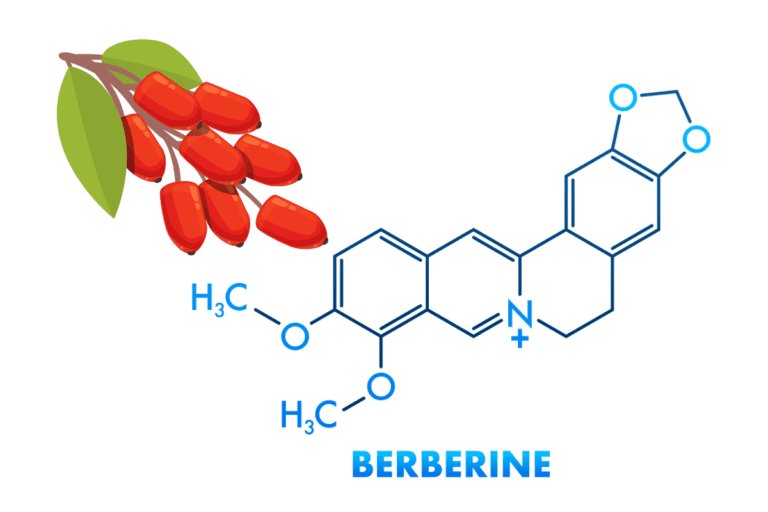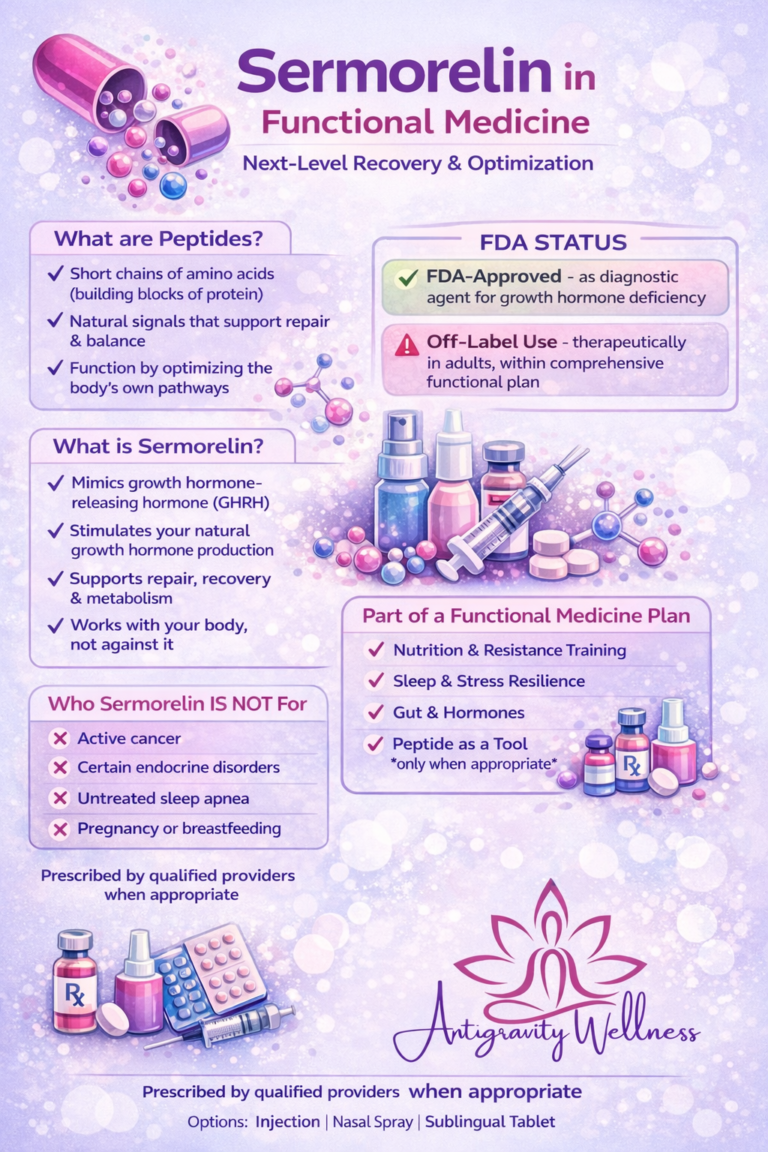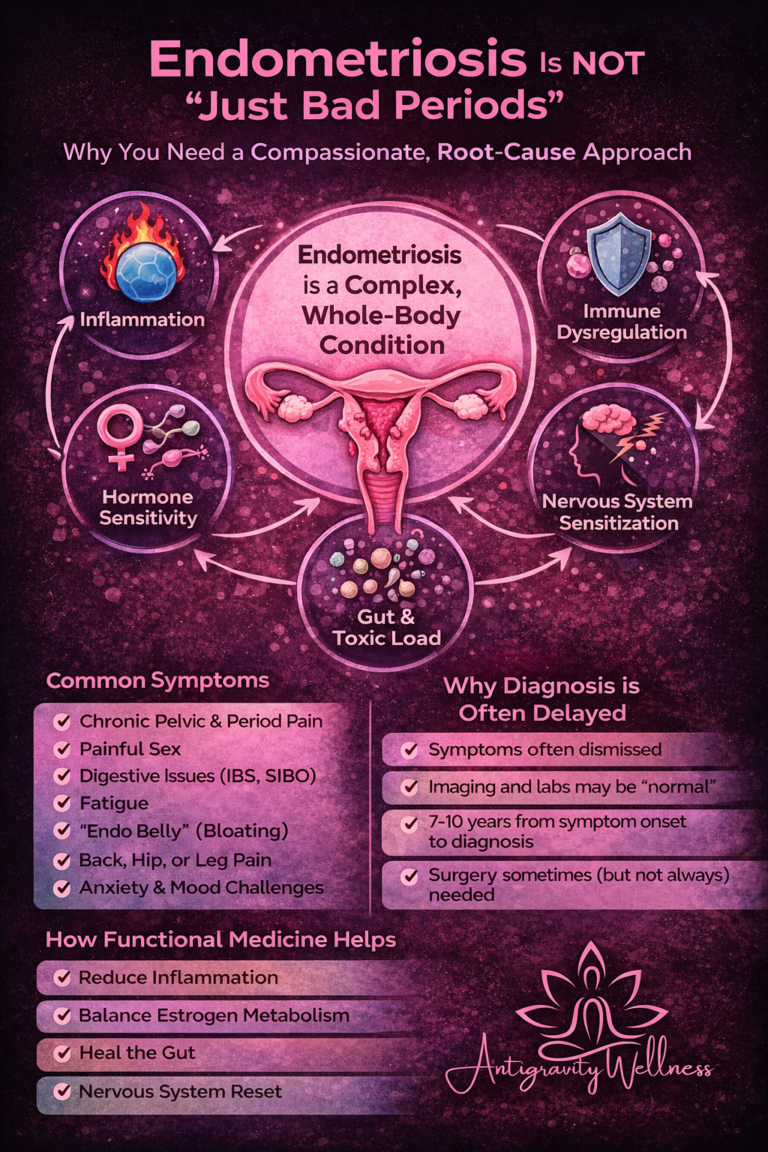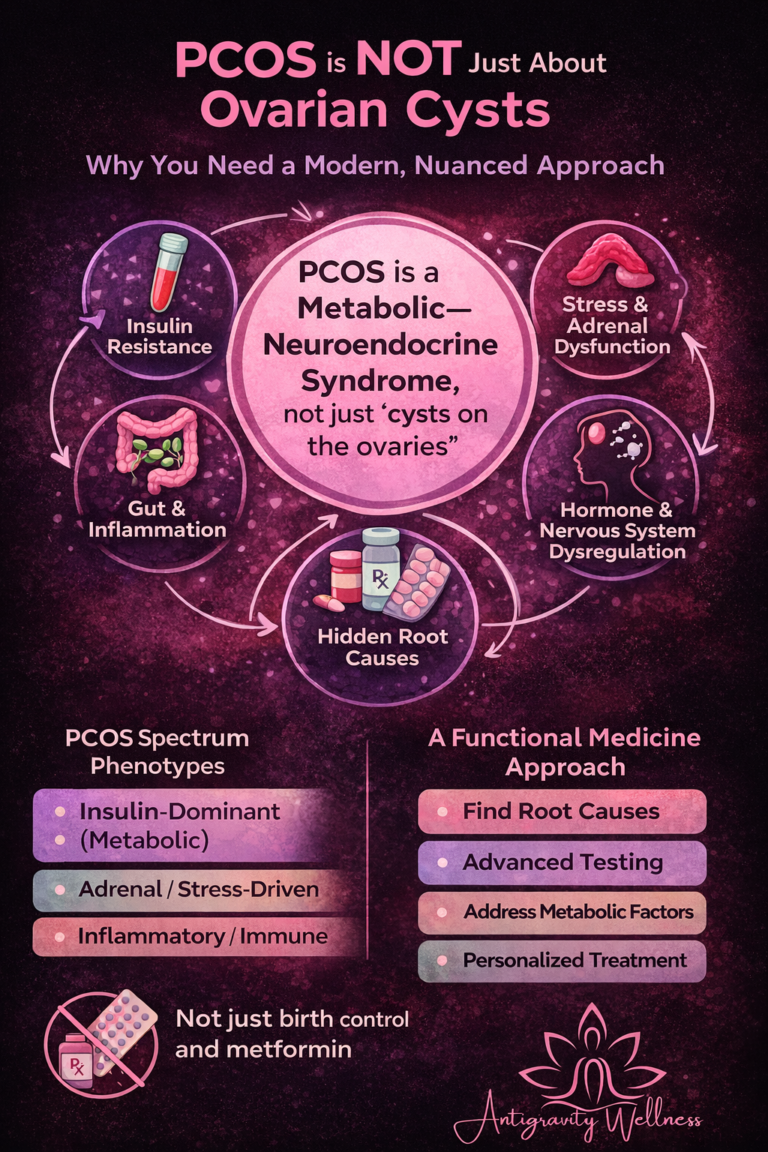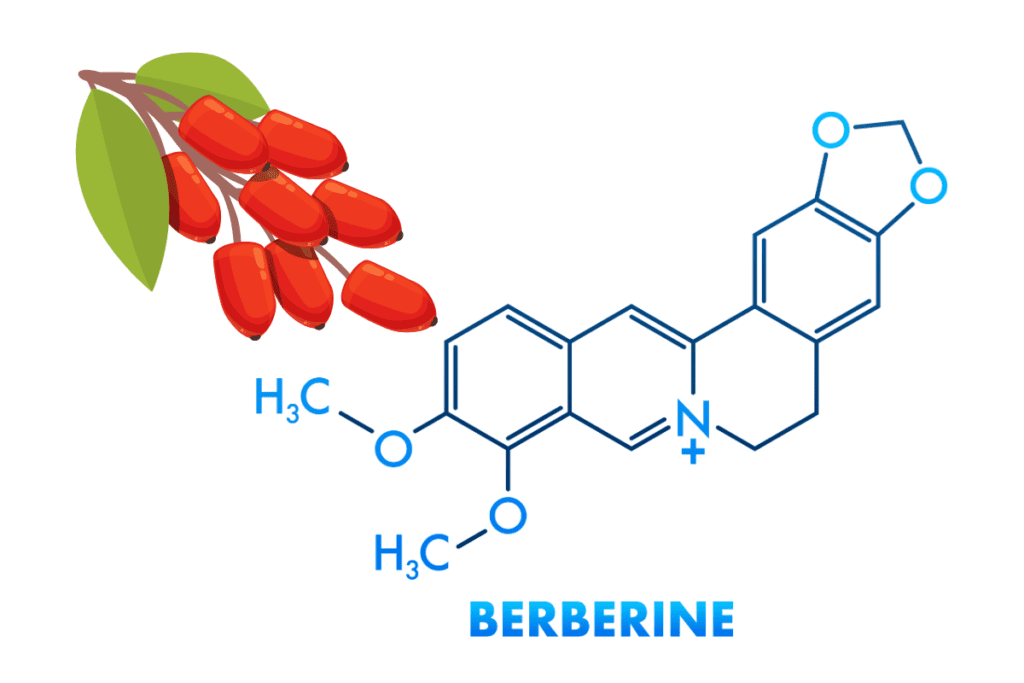
When it comes to holistic hormone health, blood sugar is one of the most overlooked pieces of the puzzle.
Too much insulin, poor glucose control, and inflammation can:
- Worsen estrogen and androgen imbalances
- Block weight loss
- Contribute to fatigue, cravings, acne, and PCOS
- Exacerbate perimenopause symptoms
That’s why at Antigravity Wellness, one of our most frequently used herbal tools—especially for women in perimenopause and early menopause—is Berberine.
Let’s talk about what it is, how it works, who benefits from it, and how to use it safely and effectively.
What Is Berberine?
Berberine is a plant alkaloid found in herbs like Berberis vulgaris (barberry), Coptis chinensis (goldthread), and Hydrastis canadensis (goldenseal). It’s been used in Traditional Chinese Medicine and Ayurveda for thousands of years to support digestive and metabolic health.
What makes Berberine so powerful is its multi-targeted effect on metabolic pathways. It works like a natural version of metformin—without the harsh side effects.
How Does Berberine Work?
Berberine works through several mechanisms, including:
- Activating AMPK, the “metabolic master switch” that boosts insulin sensitivity and fat burning
- Regulating blood sugar and reducing insulin resistance
- Supporting gut health by balancing microbial diversity and reducing bad bacteria overgrowth
- Lowering inflammation and oxidative stress
- Improving lipid metabolism, helping lower cholesterol and triglycerides
A 2012 meta-analysis in Metabolism concluded that Berberine is as effective as metformin in improving insulin sensitivity, lowering blood sugar, and aiding weight loss—especially in people with PCOS and metabolic syndrome (Yin et al., 2012).
What Are the Benefits of Berberine for Women?
At Antigravity Wellness, we use Berberine to support:
- Insulin resistance and blood sugar dysregulation
- Weight loss resistance, especially around the belly
- PCOS and elevated androgens (testosterone, DHEA-S)
- High fasting insulin or HbA1c on lab work
- Cravings, energy crashes, and reactive hypoglycemia
- Estrogen dominance (by reducing insulin and aromatase activity)
- Cholesterol support, including LDL, triglycerides, and total cholesterol
- SIBO or candida overgrowth in gut protocols
Berberine is especially helpful for women in perimenopause who are noticing stubborn weight gain, erratic energy, or new glucose issues that didn’t exist in their 30s.
How Do You Take Berberine?
We typically recommend:
- 500 mg taken 2–3 times daily, with meals
- Dosing before or with carb-heavy meals for best blood sugar support
- Start low and titrate up to avoid GI discomfort
- Use professional-grade, pure Berberine—not blends with fillers
Duration depends on the goal. For blood sugar and weight loss support, 3–6 months is typical, followed by re-evaluation with labs and symptom check-ins.
What Kind of Results Can You Expect?
With consistent use and lifestyle support, Berberine can:
- Lower fasting glucose and insulin
- Reduce carb and sugar cravings
- Improve weight loss—especially in the midsection
- Stabilize mood and energy throughout the day
- Improve cholesterol and triglyceride levels
- Support better gut function and less bloating
A 2020 study in Frontiers in Pharmacology found that Berberine also improved ovulation and hormone balance in women with PCOS, supporting both fertility and long-term hormone regulation (Zhu et al., 2020).
Are There Side Effects or Precautions?
Berberine is generally well tolerated, but may cause side effects in some women, especially at higher doses or when taken on an empty stomach.
Possible side effects include:
- Nausea
- Constipation or diarrhea
- Cramping or bloating
- Headache or fatigue in rare cases
⚠️ Important notes:
- Not recommended during pregnancy or breastfeeding
- May interact with medications like blood sugar or blood pressure drugs—always check with your provider
- Avoid using long-term without supervision—Berberine can alter the gut microbiome if used indiscriminately for too long
We always pair Berberine with gut and liver support, a whole foods diet, and movement strategies to maximize results and minimize risks.
Case Study: Meet “Maya”
Name changed for privacy
Maya, 43, came to Antigravity Wellness with weight gain that wouldn’t budge, mood swings, and new breakouts around her jawline. Her labs showed:
- Elevated fasting insulin
- A rising HbA1c
- High-normal testosterone
- Estrogen dominance
- A sluggish gut and mild bloating
She had been told she was “on the verge” of prediabetes, but her provider didn’t offer her much help beyond “watch what you eat.”
We started her on:
- 500 mg Berberine 3x/day with meals
- A hormone-supportive, low-inflammatory nutrition plan
- Magnesium, inositol, and gut support
- Light strength training and morning walking for insulin sensitivity
Within 4 weeks, her energy stabilized. By 8 weeks, she was down 7 pounds (mostly around her midsection), and her acne and PMS had dramatically improved. At her 3-month follow-up, her labs had normalized, and she felt in control again.
“Berberine was like flipping a switch. I didn’t realize how off I’d been until I started feeling balanced again.”
Berberine Is a Powerful Ally—When Used Intentionally
Berberine isn’t just for people with diabetes—it’s an incredible tool for hormone balance, metabolism, and gut health, especially for women in perimenopause and early menopause navigating the metabolic shifts of midlife.
At Antigravity Wellness, we use Berberine strategically—never as a standalone fix, but as part of a comprehensive, personalized plan rooted in testing, symptom tracking, and whole-body support.
Ready to Balance Your Hormones and Blood Sugar Naturally?
🎁 Start with Our FREE 5-Day Hormone Reset Mini-Course
Learn how blood sugar, insulin, and hormone imbalances are connected—and what to do about it.
Get it here: https://social.antigravitywellness.com/mini-course-freebie
👩⚕️ Need a custom plan and lab review?
Book a Brief Initial Consult with Dr. Nicole Smith, DNP, FNP-C, to explore if Berberine—or another metabolic support strategy—is right for your body.
Book a call here: https://l.bttr.to/6lFHL
References:
- Yin, J., et al. (2012). Efficacy of berberine in patients with type 2 diabetes mellitus. Metabolism, 61(5), 633–640.
- Zhu, X., et al. (2020). The effects of Berberine on PCOS: A systematic review. Frontiers in Pharmacology, 11, 606.
- Zhang, H., et al. (2008). Berberine reduces insulin resistance through protein kinase C-dependent up-regulation of insulin receptor expression. Metabolism, 58(1), 109–119.

